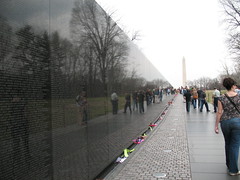 Image by Kim Smith via Flickr
Image by Kim Smith via Flickr
Wednesday, December 23, 2009
The Missing Years
Friday, October 9, 2009
Hunting - With Apologies to Sandy
 Image by cj berry 2009 via Flickr
Image by cj berry 2009 via Flickr
I seldom hunted with Daddy. He didn't like to roam around hunting - he preferred to sit silently in one place and wait for the game to come to him. It must have been effective, because he always came home with game. He only hunted with a .22 rifle. I never saw him with a shotgun unless he was trying to get blackbirds out of his planted fields. One time he killed over a hundred starlings with two shots from a 16 guage. Daddy told us that when he was very young - and when everyone was very hungry, the whole family would go out at night and surround bushes and drop a blanket over each bush and collect the birds that were under it for eating. It didn't matter what kind of birds they were either. I remember him saying that Crow tastes a lot like chicken!
As I've probably mentioned earlier, there were no deer in our area then. Deer had been hunted out of the area well before the War Between the States. The only SC deer were in the "low country." Someone brought us some deer meat from a hunt in the low country and Mamma fried it and covered it with gravy. I really liked it.
Sometimes we would catch a turtle or two and make a stew. The story that was most often told was that "there are 7 kinds of meat on a turtle!" I never knew because I wouldn't touch it.
Thursday, September 3, 2009
Anyway, we were making a rabbit box and around 4 o'clock that afternoon I started feeling bad. Kind of droopy and achy. I kept building the box and when it was complete I walked in and told Mamma that I had to go to bed. Just like that it was on. Everybody in the family caught the flu and everybody was the sickest that any of us remember. We couldn't even go to the doctor and he couldn't come to our house because there were so many cases. He just told Mamma that everyone should take Bufferin every two hours until the fever broke. I had never heard of Bufferin until that day and we all thought is was a wonder drug. It sure helped the fever and the aches.
At one point we were all so sick we just stayed in bed and helped Mamma remember when it was time for Bufferin. Eventually, we all made it through and recovered.
Now we know that the "Asian Flu" was an Avian strain called H2N2 and it eventually mutated into H3N2 which caused the 1969 outbreak, or "mini-pandemic." I'll chat about H3N2 when I'm talking about the Air Force later on.
What did we do with the rabbits? We ate them!!
Sunday, August 30, 2009
Wood Heating

To me, there is no better heating system than one fired by wood. The smell of wood smoke is definitely better than that of coal - even though coal makes a hotter fire. I've never tried burning cow chips or charcoal to heat a house, but I'll bet that wood smells better.
Wood warms you two times. You get warm when you're cutting, splitting and hauling; and you get warm when you burn the wood. I remember wood gathering parties that started early on a saturday morning when the temperature was in the low 20's that made you want to get a tree on the ground fast so that you could start working on it and stop freezing! On those mornings the chain saw would balk and sputter and finally crank. Sometimes we had to mix kerosene with the chain oil to make it flow down the blade.
When I was between 6 and 12 we only cut wood with manual saws and axes. Two people on a cross cut saw can fell a tree fairly quickly - perhaps in 10 or 15 minutes. But then you have to cut it into useable lengths. We had a cutoff saw near the house that would run off the PTO of the Cub tractor, but you had to get the wood to the saw and that was work.
Later, after Daddy died, Mac bought a Homelite chainsaw, and then a Poulan and then another Poulan. With one of those we could cut and split a truckload in an hour or so. We still had to split the wood with axes and mauls, but it was good wood and a lot easier to get. Then Ben bought a Husqvarna and a motorized splitter and we could really cut and split woodl. We have burned a lot of firewood in this family in the past half-century.
Wednesday, August 26, 2009
Fencing
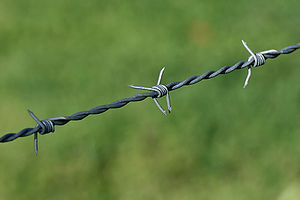 Image via Wikipedia
Image via Wikipedia
Barbed wire fences have many enemies. It is really not unusual for a tree which is leaning away from the fence at a 45 degree angle to suddenly reverse its lean and fall directly on the wire. In such cases the repair involves a chainsaw and several posts. The wire, being stretched significantly by the tree becomes very loose in all directions and must be tightened. There is not enough wire present to join together with a twist, so you must always patch in a short piece of wire - making the resultant fence an engineering marvel, but an artist's eyesore. Other enemies of fences are hunters who wreck them for no reason at all, bulls and large cows who just have to have the grass on the other side and time which rusts the most expensive wire and rots the most resilient posts. If you own one mile of exterior (or perimeter) fence; odds are that at any given moment there is a weak spot or hole in it. Many times the hole will be large enough for 5 cows to elope with the neighbor's bull at the same time.
A cow that leaves through a hole in the fence will remember that place and return home - most of the time. However, before the prodigal decides to "make nice" she will generally leave a large pile of cow droppings in someone's rosebed, or trample an acre of sweet corn in order to get to the other side, or especially if she is completely black in color, she will have to stand in the road at night. And most neighbors and motorists are really not that understanding. A lot of times they want you to pay them for the damages! Sometimes they incarcerate your cow in a barn and keep her until you fix or pay for the damages! Many times, county law becomes involved making any serenity that you may have go up in flames.
I guess I don't know which is the worse - cows or fences...
Monday, August 24, 2009
Wood Shop

Sunday, August 16, 2009
Marblebutt and the Bra
 Image by Janrito Karamazov via Flickr
Image by Janrito Karamazov via Flickr
Ah! The bra prank! I absolutely had no involvement whatsoever. I was just a very innocent bystander. Arriving on the bus one morning I was immediately approached by Ronnie and Guy who covertly pointed to the top of the school's flagpole. There in all it's glory waved a rather large brassiere, white in color and humongous in cup size. We basked in the hilarity of it all, trying to blend with the crowd who were beginning to notice and pass along this delicious prank to each other.
The front door of the school, which NEVER opened before the appointed time sprang open. Out rushed old Marblebutt the principal. He went straight to the flagpole, blushing a very bright red, lowered the offending garment and placed it under his suit coat. Then, still not speaking, he rushed back into the school with the entire student body laughing unto tears! What a glorious moment.
I will say this for the old man. He may have done some quiet sleuthing, trying to find the authors of the deed, but he never mentioned it again. That had to take some class. As for Ronnie and Guy, my guess is that some unsuspecting matron left her underwear on the line on Sunday night and seeing it waving there in the dark sparked a most ingenious plan.
Friday, July 31, 2009
4-H Clubs
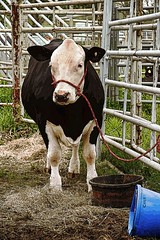 Image by Big Grey Mare via Flickr
Image by Big Grey Mare via Flickr
My first ever "club" was the 4-H Beef Growers Club. There were about 10 of us in the county who grew our own show calf and fattened it up for the Fat Calf Show that occurred every year in the spring at Warners Sale Barn. We spent the winter feeding, grooming and training the calves to be led by a halter and to take a "show stance." Our club didn't meet but once per year and that was at the show. We all kept our calves and methods very secret and really didn't know each other's names very well.
The second year that I showed a calf, I had the Grand Champion of Greenwood County. Boy was I proud. I had named him Phillip and he and I had spent hours and hours together for almost six months. The problem was that I was going home and Phillip wasn't. Winn-Dixie food stores paid $1.00 per pound for him and he weighed almost 900 pounds. Hmmm. Let me see, Winn-Dixie food stores. It took me about a minute to figure that one out. I wasn't a happy camper, but I took the money. I hope Phillip pleased a bunch of steak eaters. I showed again for the next two or three years and had a Reserve Champion (second place) but never again won. The money that I saved from those calves went a long way towards paying tuition once I started college.
In the 9th or 10th grade Daddy wanted me to join the 4-H Tractor Club. I had skirted the periphery of 4-H and really didn't want to play, but we talked about it and I agreed. My friend Thomas went with us every Wednesday night to the George Davis Buick place where we met. There was a workbook and actual hands-on tractor work. We learned how to grease all the 29 points on the tractor that we were using for the club, how to change the oil, how to do everything with a tractor. One thing that I managed to miss was the excercise where we backed a 4 wheel wagon with a tractor. I had tried it several times at home and never had much luck. Heck, I couldn't even back a two wheel wagon!
Being in these activities qualified me to attend the one-week 4-H camp that was held every year at Camp Long in Aiken County. As I remember, 4-H camp was something that I enjoyed very much and always looked forward to in the Summer. We did crafts, sang a bunch of songs, took safety classes, swam, played ball and went to dances every night. I wonder if they still have 4-H camp there? I wonder if they still have 4-H camp anywhere?
Wednesday, July 29, 2009
Swift Strike II
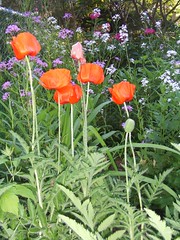 Image by bill barber (very sporadic) via Flickr
Image by bill barber (very sporadic) via Flickr
At some point during junior high school the United States Army, in an effort to change it's way of fighting from a "front lines, head-to-head" type to one of dealing with insurgents decided to bring tens of thousands of soldiers to North and South Carolina for the most humongous excercise ever conducted. The exercise, dubbed "Swift Strike II" was not limited to military reservations, but was conducted on the streets, roads and highways of both states. Troops parachuted into our fields, road marched along our highways, trespassed in our gardens and orchards and suffered the ills of the south that they probably thought would be the worst they ever saw. There were thousands of soldiers bivouaced at the Greenwood County Airport and thousands more in the woods and fields all across the state.
These were the "blue forces" or the "good guys." Acting as red forces were the Green Beret's and other Special Ops folks who already had a taste of Viet Nam and irregular fighting methods. The red forces were assigned to recruit civilians and win our hearts and minds so that we could be used against the blue guys. I and my friends Steve, Jimmy, Jokie and Richard fell right in with them and provided them with water, food and gasoline. We all spied on the blue forces - riding our bikes up and down the rows of tents, counting, pacing, making drawings; but Steve and Jimmy actually rode their bicycles through the camp one night with firecrackers blazing. I'll bet that was a sight!
Anyway, even though we didn't know it at the time, we had been hooked and landed and would forever be in uniform. Steve went to the Air Force Academy, Jimmy and I went to OCS - to be followed a couple of years later by Jokie - and Richard enlisted in the Air Force. Steve went on to become a full Colonel, Jokie became a Lt/Colonel and a back seater in F-4 Phantoms, and I ended up as a Captain before leaving the Air Force and moving to the Army Guard. Richard got out as soon as he could and Jimmy was separated for a problem with his leg before being commissioned.
We termed ourselves the 601st Infantry and kept up the tradition for years and years after the Army left us to our own devices. Someday, maybe after I'm sure about the Statute of Limitations I'll tell some of the daring deeds that we did, but for right now you'll just have to imagine.
Jimmy's gone now to a cancer. Richard and Jokie live in Alabama and Steve lives in California. Guys if you read this, I still go on midnight missions along the roads and conceal myself in the bushes when a car is coming. I sometimes yell "CAR !!!!" to myself and remember our scrambling around. No raids though - I've had enough of the real stuff to satisfy my need to play. Review, friends - troops long past review.
Tuesday, July 28, 2009
Band - Mr. Putman
 Image via Wikipedia
Image via Wikipedia
Band was the one redeeming feature of Junior High School. In the band room I was one of the better trumpet (cornet) players and moved back and forth between 1st Chair 1st and 1st Chair 2nd. Once Mr. Putman made me play 3rd Chair 3rd just so I could learn to play the part. I thought I was pretty good. I don't even remember what we played - except it was usually some English march that sounded like it was played by a junior high school band. We tootled and honked and had a big ol' time at ball games and in parades.
Mr Putman - Bud Putman was the only reason that any of us really had fun. He was a funny man and had some really weird (weird but good) ideas about music, band and life in general. I remember one day that he stopped us from playing and talked for a while as our lips recovered. The subject that day was from the novel War and Peace. He said that somewhere around halfway through the book there was a statment that said something like, "If you want a life where you don't have to think, where your meals and clothes are furnished and where you simply have to do what you're told; then join the army. Now that I think about it, that was Mr. Putman's way of snickering at organized mayhem, but I took it as something that made a lot of sense. Not that I didn't want to think, but the whole idea sounded like something that I should maybe pursue.
After I returned from Iraq I had dinner with Bud and his wife Mary. They - like some other of us - are getting a little age on them, but they are fine people and we enjoyed reminiscing about those golden years so long ago.
Monday, July 27, 2009
The Duck
 Image via Wikipedia
Image via Wikipedia
Another junior high school teacher who influenced my life quite a bit was Mrs. T____. Our code name for her was "Duck." Not because she would swing at you and cause you to duck, but because she waddled like a fat duck when she walked. She taught us all about first aid and then all about "social relations." Well, she taught us at least "some" of each. They didn't call it Sex Education in those days, but that's what it amounted to. That was one semester. The next semester I had a study hall in Mrs. Duck's classroom.
Duck didn't do "understanding." When she perceived something then that is what happened. I clearly remember sitting at my desk, calmly doing whatever it was that I was supposed to be doing and the kid behind me (one of the "country club" set named Barry Rayborn) kept sticking me with a pencil. I was already bleeding in several places and I had asked her to make him stop. She had ignored my request much to my embarrassment and to the delight of the class who were enjoying this particular torture. I once again settled down and was jabbed in the hand with a very sharp # 2 Eagle when I snapped. Rising from the desk I turned towards and jumped on Barry and began pummeling him with all my might. Somehow she got me off him and we all three headed to Mr. Mablebutt's office. I of course was wrong and no manner of explaining, demonstrating or telling had any effect at all on the old man.
Barry and I were put outside and told to run around the parking lot until he told us to stop. Barry was really mad and tried several times to knock me down but I managed to outdistance him. After several quarter mile laps, we began to tire and Ol' Marblebutt came out on the track with his paddle made of a rocker from an oaken chair and commenced to beat us until we weren't tired anymore. We did this every fifth period for a week.
I still bear the marks made by the pencil on my right forearm and my right palm. However, Barry never again tried terrorizing me. It was worth something. Later in life I met Mrs. T____ on the street in Greenwood and without realizing what I had done, addressed her as Mrs. Duck. It was embarrassing for me, but she apparently didn't care.
Saturday, July 25, 2009
Seventh Grade
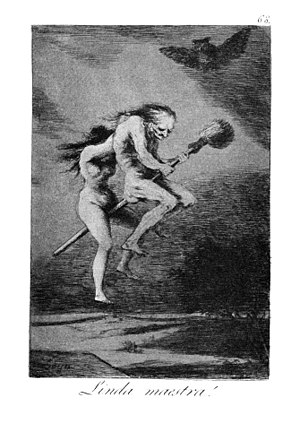 Image via Wikipedia
Image via Wikipedia
The three years that I spent in Junior High were pretty much the most miserable of my life. It's a pity that they coincided with me being 13 - 15 years old. There was so much misery. I won't use teacher's real names here because I'm going to be pretty negative about them. In fact with few exceptions I don't remember the names of many at all. I will use some of the derogatory names that we dreamed up or inherited from those before us.
Anyway I did three years in the hell of Northside Junior High School and seldom had anything to smile about.
Seventh Grade English - Ms. R___ was of the old school. She ran her classroom with an iron gauntleted fist and she and I knocked heads from the beginning. Do you recall parsing (or diagramming) sentences? This word underlined, these words written on downward sloping lines; nouns, verbs, adverbs, prepositions, participles, adjectives, etc.,etc!! So much garbage. It is like having to remember the name of the firing pin retaining pin in the M-16 bolt carrier group. You just know what it is, you know where it goes and you know that your weapon won't work right without it. I hated parsing sentences. I hated having to identify the different nomenclatures of words. I hated seventh grade English and I definitely hated Ms. R___. One particular day in the spring I remember her gripping and squeezing my upper arm to the point that I almost cried. As I left the room for my next class I said loudly, "I hope she has a heart attack and dies!!" During the next class some 9th graders were playing outside and they began to pester Ms. R___ through the open windows. She yelled at them for a while and when that didn't work, she went outside to chase them down. The heart attack wasn't fatal, but we never saw the old biddy again. Of course I gained some notoriety because my wish came true - and I have always been VERY careful about what I wish for since - but that was one of the best days in 7th grade.
Of course there are more vignettes where this one came from and you'll be seeing some of them soon. Did I mention that junior high was the nadir of my whole life?
Monday, July 20, 2009
Back Home Again
 Image by Jeff McCrory ( © jdm_photo) via Flickr
Image by Jeff McCrory ( © jdm_photo) via Flickr
The sights were a little masked by a giant tundra or taiga fire burning between Denali and Fairbanks. We went near it on the Alaskan Railway and for a couple of hours it was completely dark as we passed through and under the smoke. That's the only nighttime that we experience for the whole 12 days. We did manage to get some pretty good pictures and will share them as time goes by.
I'll get back to the "life and times" again as soon as some inspiration strikes me.
Friday, July 3, 2009
Entr'acte
 Image via Wikipedia
Image via Wikipedia
A Special Day
 Image via Wikipedia
Image via Wikipedia
Sometime in the afternoon we were allowed to go outside to our families. Pat and I spent our last hour together before I left, sitting on the curb outside the building. About dark, we were herded onto a bus and thence to an airport and onto an airplane (my first ride) and shipped off to San Antonio Texas. We arrived at about 11 o'clock at night and were bussed to a sheltered area on base (Lackland AFB) where we waited until about one in the morning for everyone to arrive. Then it was off to the barracks where we were told to sleep. Fifteen minutes later we were told to get up and get outside - someone had forgotten that all incoming servicemen had to be fed within a couple of hours of arrival. We walked to a chow hall where I had my first military meal, found out what SOS looked and tasted like and then got back to bed by 3 or so. At 5:30 we got back up and went back to the chow hall for more food and then we were bussed to Medina Air Force Station. (Medina was the site of the first sizable nuclear accident in the Air Force. In 1959 a "nuke" was being disassembled there and yeilded with approximately the force of 60 tons of TNT. According to locals, it was "pretty loud". According to the Air Force it was "non-nuclear." One very large concrete bunker disappeared.
At Medina we were ushered into a huge blue auditorium where we started finding out just what the hell was going to happen to us. I was still numb and relatively dumb at that point and decided to wait and see. Around 1000 hours (note that I was now on 24 hour time and "o'clocks" were a thing of the past) we were herded into groups and marched down to our barracks, assigned to our rooms and informed that since it was now the Fourth of July we had the rest of the day off. At some point I had a couple of minutes to myself without the luxury of being yelled at and I took that time to ask, "What have you gotten yourself into this time????"
The ride had been a mere "didibop" until that day!
Tuesday, June 30, 2009
There Be Dragons
 Image via Wikipedia
Image via Wikipedia
I've never been to any of those places though I have lived in a number of places in the northern half of the Western Hemisphere. I think though that a lot of my sense of adventure or "adventure quotient" came from those readings. I once read that people like me love to look at old maps and in particular those maps which have the caption "There be Dragons" on the very edge of the world. I've done some interesting jobs too and will talk about them later when I get this period of my youth completed.
Few have placed their hand on the key used to release megatons of nuclear weapons. Fewer still have programmed the delivery vehicles for them. And I'm willing to be serious money that I am the only one who having done this was also a foot soldier in Iraq! Life with the dragons has helped me feel significant and shown me the world, but now, with those days complete I still seek the lost horizon...
Monday, June 29, 2009
Magnolia Playground
 Image via Wikipedia
Image via Wikipedia
In the middle of the yard, we could play football though I was seldom involved because I didn't have a clue how to play. I do have a clear memory of when Walt Latham broke his leg at recess. There was a huge pileup and an audible "snap". That was the first time I'd heard a human bone break.
One part of the playground was in a corner next to the school where we could go if we didn't want the teachers to see what we were up to. That's where I had my first kiss. WOW! I was impressed and of course embarrased and all jittery. It was a long time before something like that happened again. As I think about it now, there should be a stone marker there with a brass plate on it with the date and time.
The farm was my other playground and that's one that will take a posting of its own. Imagine a playground of almost 500 acres of fields and woods and added to that another couple of thousand acres that belonged to neighbors.
Sunday, June 28, 2009
De La Howe's Tomb
 Image by Let Ideas Compete via Flickr
Image by Let Ideas Compete via Flickr
The pine trees that I remember seeing as a youngster towered well over 100 feet in the air and there were thousands and thousands of them. I guess they have been cut now, but they really were something to see in those days. I remember the family visiting the tomb and Mamma telling everyone that De La Howe's Wife and Mistress were both buried in the enclosure. The story now is that he and "several members of his family" are buried there.
The virgin pine forest was a great place for bootleggers in the 1920's and 30's and probably hides many patches of hemp weed today. Daddy said that the bootleggers would have spotters in the tops of the tall trees all the way around the site. The spotters would signal the people at the still with a mirror if they saw revenuers coming. He also said that if they walked the trail to the still in the morning, they would check for cobwebs stretched across. If there were no cobwebs, they wouldn't go to the still because someone else had gone down the trail since the day before.
He told a tale that a certain Mr. Mariney owned a farm near the Savanna river. One day a revenuer came to his house and asked if he could look around the farm for stills. Mr. Mariney reportedly said, Mr. Fed, you can walk down that creek to the river, you can walk back into that big holler over there and you can go most anywhere you want except that little holler over there. There's probably a big bear in that holler!
Friday, June 26, 2009
Daddy's Sawmill Job
 Image via Wikipedia
Image via Wikipedia
Thursday, June 25, 2009
Uncle Frank and Aunt Pauline
 Image via Wikipedia
Image via Wikipedia
Uncle Frank ran liquor stores and played poker. He was pretty good at it and I assume accumulated a lot of money. He also, from time to time, sold bonded liquor from his home on Sundays and after sundown. He was arrested several times, but was never convicted. Uncle Frank also drank a lot of brown liquor. His brand was Jim Beam. He used to say that a lot of doctors told him that if he didn't quit drinking, he would die. He always laughed after telling that and said, "And I outlived every damn one of them." When he was in his eighties, he had problems with blackouts and Aunt Pauline always kept a half-pint bottle of Jim Beam in her purse. When he started having one of his blackout fits, she would feed him a tablespoon of Beam and he would straighten right out.
Aunt Pauline ran a combination pool hall and beer joint near Matthews Millhill. She had four pinball machines too. Her machines would "pay off" even though it was against the law and lots of people would spend their paychecks at those machines. Sometimes she would let well known people in on Sunday and let them play pool, pinball and drink beer. Once, she was raided by the local police. As the story goes, she hit Ramey Underwood (a deputy sheriff) with her fist and broke his jaw. Then she decided to run out the back door of her bar. Unfortunately she forgot that the steps had been torn down and she broke both ankles. I know she didn't go to jail or "do time" for this, so she must have had to pay a fine.
Aunt Pauline and Uncle Frank were good people who made their living in a different way. They didn't "prey on" their customers, but they did take the money that others wanted to give up. Uncle Frank died in the 1990's and Aunt Pauline died while I was in Iraq in 2005. She left me $5,000.00 which I thought was very nice of her.
Wednesday, June 24, 2009
My Great Great Great Grandfather - Blackbeard the Pirate
 Blackbeard's Pirate FlagImage via Wikipedia
Blackbeard's Pirate FlagImage via Wikipedia
Susie just reminded me that one of my Mom's claims to fame is that she was descended from a pirate - not just any pirate, but Blackbeard the famous pirate. I really can't tell you how she arrived at this conclusion, but I can tell you that Blackbeard did spend a lot of time in Eastern North Carolina where my mother was born. Blackbeard appeared to be friends with the then governor of North Carolina, Charles Eden. Mom was born in a town called Edenton which was named after the governor. Conceivably Mamma could have had a great-great grandmother who was the consort of Edward Teach which was Blackbeard's real name. I don't know...
Mamma, Mac and I visited her hometown after she got sick. It was a good trip, just us three driving from little town to little town talking about the past. We found some people who were named "Everest", which was her mom's maiden name and actually visited one family that said that they remembered Mamma's family. They left North Carolina a long long time ago. Mamma was about five or six years old when they moved and that would have been around 1916. They moved to the swamps of South Carolina where my grandfather held several jobs over the years. He was a trapper, a trestle watcher and a farm hand supervisor.
In 1919, the whole family became ill with the "Spanish Flu" and as a result, Mamma's dad and her little sister died. That's when Mamma and her brothers and sisters had to go to an orphanage in Franklin Springs Georgia. They lived there for several years until their mom remarried. Her new husband was named "Dad Walton" and he welcomed George, Geneva and Mamma into his home. Later, her other siblings, Pearl, Edna, Enza and Bill were born.
Monday, June 22, 2009
My Grandparents
 Image by freeparking via Flickr
Image by freeparking via Flickr
I visited my Dad's parent's graves today. There was a funeral in Edgewood Cemetary that I was attending and thought I would try to find their plot. I found out that my grandfather's name was William Rufus McKinney (aka Big Papa) and that my grandmother's name was McGrath instead of Tolbert. McGrath, by the way, in this part of the country is pronounced McGraw (as in "queeksdraw mcgraw".) When I saw that I remembered a story that I had heard a long, long time ago. It seems that my grandmother was a Tolbert, but both her parents passed away when she was very young - leaving her as the heiress to a lot of land. As the story goes, her Dad's brother paid the McGrath's to adopt her so that he could take control of the properties. I also recall that the McGraths were not kind to her and that she married at a very early age in order to get away from them. My Dad said that her sister (and I can't remember her name) was married when she was 9 years old. He showed me the tree under which she played with her dolls after the wedding.
Another interesting note is that I also found my wife Pat's grandparent's graves are located adjacent to my grandparents! That's fairly odd, since they didn't know each other and grew up/ lived in different worlds - go figure.
Sunday, June 21, 2009
My Dad
 Image via Wikipedia
Image via Wikipedia
Daddy's family was close knit and they all worked on the farm they lived on. I remember him telling me that by the time he was 12 years old, he was running a 9 mule farm. His dad had bad arthritis (probably rheumatoid arthritis) and was pretty much incapable of either farming or pursuing his job of village blacksmith. At one time the family moved to Dublin, Georgia to co-op with Daddy's Uncle Perry McKinney. That was when the boll weevil took over the cotton crop and everyone went pretty much busted. They returned to McCormick County to pretty much nothing. Most of the land was sold for back taxes and they retrenched into a fairly small farm with an old farmhouse to get through the bad times. Then their house burned and they had to retrench further. I remember him saying that his grandfather's rifle from the War Between the States was burned up in that fire.
Another story about the fire was about the pump organ they had. Aunt Louise would play the organ for everyone in the community for their entertainment. When the people in the area saw the house burning they ran inside and grabbed the pump organ and took it outside. It was completely destroyed by their rough handling, but that and a few personal items were all that were saved. My dad knew that his mother really liked her pitcher and bowl that she kept in the bedroom. He was also of the habit of keeping his prized pocket knife under the same bowl. After the fire had completely consumed the house the family was sitting around exhausted and my grandmother said that she wished that she had saved her pitcher and bowl. Daddy went around one of the outlying houses and brought the bowl and pitcher to her saying that he had saved it. He said at that point that he wished he had saved his pocketknife at the same time. When he said that, she pulled his knife out of her apron pocket. She had reached under the bowl to save it.
I remembered Daddy today because its Fathers Day but now forty years after his death I still think of him often.
Friday, June 19, 2009
 Image via Wikipedia
Image via Wikipedia
If by now you haven't detected that at age 9 or 10 I was a self-centered, egotistical, little so-and-so, let me fill in the blanks for you. A kid that refuses to do homework and gets away with it is an incorrigible brat. The first thing I learned in seventh grade was that the Sunday afternoon picnic was over. Fight it, run from it, hide? Nope, none of those worked. After 9 weeks I was pretty much failing everything. I - the one that had always been the teacher's pet - was out of my element and perhaps in so deep I would never recover. I hated Northside and darn near everyone in it - teachers, classmates, eigth and ninth graders, bus drivers - all of them. I especially hated the principal, Mr. R.O. Marbert. I was a great con artist and he wasn't having any.
I began to study a little. I also did some homework. Not a lot of homework, but enough to pass a test or two. I always made A's in science classes and history, but let's say math wasn't my cup of tea. Really, who cares which train gets to Chicago first? Like I said I made some pretty good grades, but we won't go into math grades because my children and their children may read this someday.
Along about the beginning of the second semester at Northside things began to get more bearable. I was able to play my trumpet in band class pretty good and the little work I was doing got me out of the doghouse about grades. I never liked the place, but I faked it enough to get by.
One thing that I did discover that was a huge delight was Science Fiction. One day while looking around in the Library I happened to pick up a book written by Robert Anson Heinlein. As I recall the title was "Double Star" and I was soon hooked. I read all the Sci-Fi in the school library and started getting books from the public library. In class, I would open my textbook to the correct page for the lecture and then put my pulp magazine or science fiction novel inside it. As I appeared to be poring over the interesting stuff in the book I went un-noticed for the most part. It was a good trick that I used for years to keep from learning any of that ugly stuff they tried to teach us.
Thursday, June 18, 2009
The Rest of Elementary School
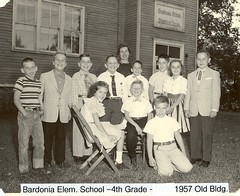 Image by clarkstown67 via Flickr
Image by clarkstown67 via Flickr
Elementary School years were pretty good. The curriculum wasn't all that tough and we were all friends - though we fought sometimes and argued a lot too. Fourth, fifth and sixth grade years are pretty much of a blur. We figured out that life was going to be: get up, get dressed, go somewhere you don't want to go, come home, do chores, go to bed.
Mrs. Gussie Sligh ran the fourth grade with an iron fist. She really tried to get us interested and she really tried to get me to do homework. When Mr Stewart was introduced into the equation I relented for a while, half did homework for a while longer, copied other people's homework on the bus sometimes and sometimes just didn't worry about it at all. I think she gave up on me towards the end and I still passed on to the next grade. The thing that I remember most about her class is both visual and olfactory imagery. We did a science experiment that involved Red Cabbage and Ink. I will never forget the smell and I added red cabbage to my list of things that I will not eat.
I''m sitting here trying to think of my fifth grade teacher's name. She had red hair and was rather old. I suspect she was in her fifties. Anyway she and I had a rough time of it. She decided that I was going to do homework and I dug in my heels. The system finally brought in my parents and homework became a supervised afternoon chore for a while. I would come home, do my other chores and then sit at the kitchen table with my books doing homework. I didn't have a clue how I was going to escape this one and finally found that I could "fake" homework to Mamma's satisfaction.
Sixth grade was Mrs. Ruth Sproles Carroll. A portly matron with cotton white hair. I don't remember much about sixth grade except that we were very "social" that year. My best friend was Gail Griffith who went to school at Northside. We took dancing lessons together, rode bicycles all over, took piano lessons together and just had a great time. Gail was a year older, so she found out about other boys and pretty soon I was on my own again. I remember that she thought that Elvis was really great. Sixth grade was to be the beginning of the end of my childhood.
Wednesday, June 17, 2009
The Grange
 Image via Wikipedia
Image via Wikipedia
My parents were members of the Grange - a farmer's organization established during the reconstruction years by seven Freemasons. The story goes that a Yankee farmer was asked by President Lincoln to come to the south and see what could be done to ease the plight of farmers. The man's name was Oliver Kelley and he did as he was asked by the president. Of course when he presented himself to the rural communities he was shunned and ridiculed as a carpetbagger. He could find no family to take him in nor anyone to give or even sell him food. One night, thoroughly depressed, he knocked at the gate of a farm and when the farmer sent him on his way, he used one of the secrets of Freemasonry to see if the farmer would recognize that. He was immediately brought into the farm house, fed and bedded down for the night. The next day he pled his case with the farmer and they subsequently visited other farmers and decided that the nation needed a fraternal organization of farmers and hence the Grange was formed.
We belonged to Woodlawn Grange and there must have been at least a hundred members. Every month Mamma would make a covered dish and we would go to the Grange meeting to share our food with others. It was the best darn eating that anyone could have. We learned quickly that Mrs. Jones made the best pound cakes - but the worst fried chicken. Mrs. Sperry could make a mean macaroni pie and Mrs Foster made a spice cake that was out of this world wonderful. After the meeting the grownups would "open the Grange" using a secret ritual and the kids would play in another part of the building. Fun days those were.
We also went to the State Grange meetings in August every year. There was always lots of politicking, oration, arguments and debates. We also had contests - knitting, canning, photography, art, etc. in which everyone vied for Blue, Red and White ribbons signifying First, Second or Third place in the contest. The winners also got a check. Sometimes there was a pink ribbon for honorable mention.
The Grange was like a large snowball rolling downhill in those days. Years later it was like a snowball headed for hell. All the old folks passed away and the youngsters went to work in town and by 1969 the organization was mostly gone. It stayed around for a few more years but in South Carolina at least it is now just a memory.
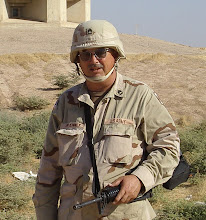
![Reblog this post [with Zemanta]](http://img.zemanta.com/reblog_e.png?x-id=fcca7edc-d3f8-43f0-9d38-54bc038e8633)
![Reblog this post [with Zemanta]](http://img.zemanta.com/reblog_e.png?x-id=6d73bcd8-01d1-4b1c-87b8-1be3b910023b)
![Reblog this post [with Zemanta]](http://img.zemanta.com/reblog_e.png?x-id=98bf8cbd-6253-4053-9fd0-d4c9b344de6b)
![Reblog this post [with Zemanta]](http://img.zemanta.com/reblog_e.png?x-id=af65dc5e-4004-4b23-bf73-55e14f4c9592)
![Reblog this post [with Zemanta]](http://img.zemanta.com/reblog_e.png?x-id=2f371c16-de51-4e43-811b-abef0493fc59)
![Reblog this post [with Zemanta]](http://img.zemanta.com/reblog_e.png?x-id=a56c7143-fb2f-459f-a360-ef2047ed2214)
![Reblog this post [with Zemanta]](http://img.zemanta.com/reblog_e.png?x-id=7f6c71ac-2deb-4841-a76e-54564016ed7a)
![Reblog this post [with Zemanta]](http://img.zemanta.com/reblog_e.png?x-id=ab7ea21c-03bd-412c-b6c9-b8c9ddc23b6d)
![Reblog this post [with Zemanta]](http://img.zemanta.com/reblog_e.png?x-id=5e5487b1-e438-4905-8509-19acd85bca92)
![Reblog this post [with Zemanta]](http://img.zemanta.com/reblog_e.png?x-id=6e61e442-3585-4c94-9fd9-4f7c918faad6)
![Reblog this post [with Zemanta]](http://img.zemanta.com/reblog_e.png?x-id=276cc8a3-9500-4db0-8a41-4e5d008fda4a)
![Reblog this post [with Zemanta]](http://img.zemanta.com/reblog_e.png?x-id=95b13f02-a8a2-414a-b3ab-f202780cc443)
![Reblog this post [with Zemanta]](http://img.zemanta.com/reblog_e.png?x-id=f5c67adc-2b63-401d-aca5-8a64d4bdbe12)
![Reblog this post [with Zemanta]](http://img.zemanta.com/reblog_e.png?x-id=783d5a71-0539-49b8-a0b9-e7562ac99fff)
![Reblog this post [with Zemanta]](http://img.zemanta.com/reblog_e.png?x-id=a6682ab8-41f4-4f9b-ab2b-1e8cdd84c29f)
![Reblog this post [with Zemanta]](http://img.zemanta.com/reblog_e.png?x-id=13a690f1-3309-481d-900d-86c648c70d82)
![Reblog this post [with Zemanta]](http://img.zemanta.com/reblog_e.png?x-id=fd3ee1fc-09d3-4414-b728-3e640a4f2ed3)
![Reblog this post [with Zemanta]](http://img.zemanta.com/reblog_e.png?x-id=55a347a0-30e5-440a-98e8-190a9a88714e)
![Reblog this post [with Zemanta]](http://img.zemanta.com/reblog_e.png?x-id=6a6f82e4-92bc-4e56-954a-f5f2d4bcc220)
![Reblog this post [with Zemanta]](http://img.zemanta.com/reblog_e.png?x-id=bd968b73-1162-46e9-a2c4-645b0b55ffbf)
![Reblog this post [with Zemanta]](http://img.zemanta.com/reblog_e.png?x-id=ca65c2fa-f3a3-4ce5-bf8c-1198933a0265)
![Reblog this post [with Zemanta]](http://img.zemanta.com/reblog_e.png?x-id=61de76af-ddcd-4192-b7e5-e3aa34a7173f)
![Reblog this post [with Zemanta]](http://img.zemanta.com/reblog_e.png?x-id=128c349b-4fdc-4c06-b2c6-9a6cda5e9432)
![Reblog this post [with Zemanta]](http://img.zemanta.com/reblog_e.png?x-id=da5ab848-2b2a-4e86-b7d3-a0145a0999a9)